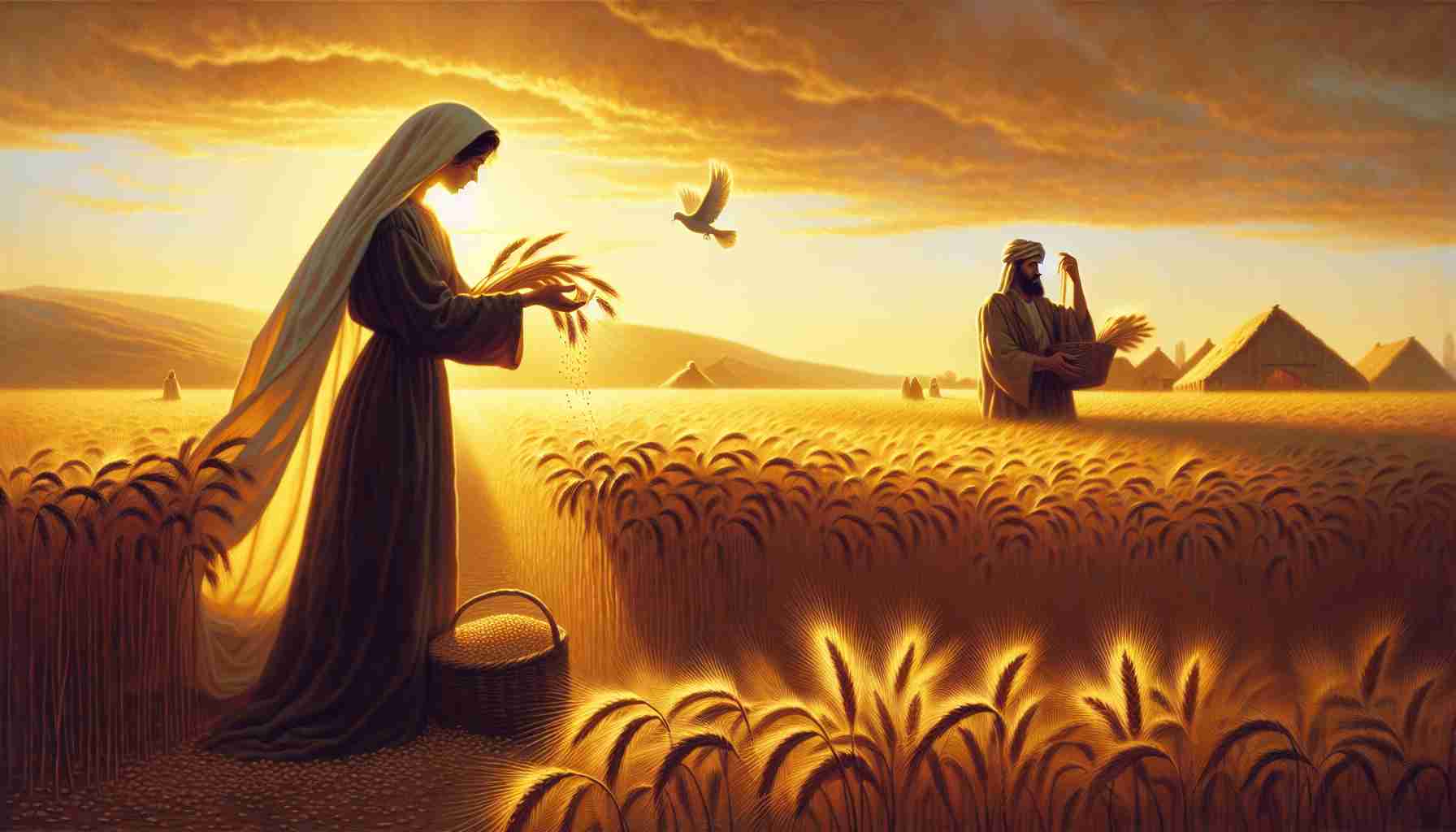

The sun burned low over the barley fields outside Bethlehem when I first saw her—head down, hands raw, gathering what others had left behind. Ruth, they called her. A Moabite. A foreigner. People whispered about her in the village. “Foolish girl,” they’d mutter. “Following an old widow with nothing.” But I saw more than that. I saw hunger that wasn’t just for bread.
You won’t find my name in the scrolls. I was one of Boaz’s workers—just a young man who tied bundles and kept count. But I remember the day Ruth bent low behind us, gleaning stalk by stalk with a quiet determination I couldn’t explain.
She never begged. Never demanded. Just worked. And when Boaz came that morning, I expected him to ignore her like the others. But he didn’t.
“Whose young woman is this?” he asked.
“Ruth,” I said. “The Moabite who returned with Naomi.”
Boaz said nothing at first. Then he walked to her—calm, kind—and told her to stay in his field, to drink from our water jars, to work in peace. She looked up, startled. “Why have I found favor in your eyes?” she asked. “I’m just a foreigner.”
Boaz smiled, but there was something deeper behind his eyes. “I’ve heard what you did for Naomi. How you left your people and your gods. How you came to seek refuge under the wings of the God of Israel.”
I swallowed hard. Refuge. That word stayed with me.
Later, I watched her eat with us, crouched near the fire, her smile small but real. She took nothing for granted. And Boaz—he saw her. Not just as a stranger. But as someone chosen.
That night, I sat alone near the edge of the field, watching the stars burn above the hills. I thought of how easy it was to overlook someone like Ruth. To dismiss what we didn’t understand. But God didn’t. He saw her before any of us did. He guided her steps from Moab to our town—not to be pitied, but to become part of His promise.
And Boaz? He didn’t just feed her. He married her. He made her family.
Their child, Obed, would one day hold Jesse on his lap. And Jesse would raise a boy named David.
The same David who would become king.
The same David from whose line the Messiah would come.
And it all started with a quiet woman in the fields. Ruth. The outsider who became the thread in the greatest story ever told.
So now, whenever I pass those fields, I run my hand through the barley and remember: God doesn’t measure people by where they’re from—but by how they love, how they stay, how they trust.
He saw Ruth.
And because of that, He showed the rest of us what redemption looks like.
The sun burned low over the barley fields outside Bethlehem when I first saw her—head down, hands raw, gathering what others had left behind. Ruth, they called her. A Moabite. A foreigner. People whispered about her in the village. “Foolish girl,” they’d mutter. “Following an old widow with nothing.” But I saw more than that. I saw hunger that wasn’t just for bread.
You won’t find my name in the scrolls. I was one of Boaz’s workers—just a young man who tied bundles and kept count. But I remember the day Ruth bent low behind us, gleaning stalk by stalk with a quiet determination I couldn’t explain.
She never begged. Never demanded. Just worked. And when Boaz came that morning, I expected him to ignore her like the others. But he didn’t.
“Whose young woman is this?” he asked.
“Ruth,” I said. “The Moabite who returned with Naomi.”
Boaz said nothing at first. Then he walked to her—calm, kind—and told her to stay in his field, to drink from our water jars, to work in peace. She looked up, startled. “Why have I found favor in your eyes?” she asked. “I’m just a foreigner.”
Boaz smiled, but there was something deeper behind his eyes. “I’ve heard what you did for Naomi. How you left your people and your gods. How you came to seek refuge under the wings of the God of Israel.”
I swallowed hard. Refuge. That word stayed with me.
Later, I watched her eat with us, crouched near the fire, her smile small but real. She took nothing for granted. And Boaz—he saw her. Not just as a stranger. But as someone chosen.
That night, I sat alone near the edge of the field, watching the stars burn above the hills. I thought of how easy it was to overlook someone like Ruth. To dismiss what we didn’t understand. But God didn’t. He saw her before any of us did. He guided her steps from Moab to our town—not to be pitied, but to become part of His promise.
And Boaz? He didn’t just feed her. He married her. He made her family.
Their child, Obed, would one day hold Jesse on his lap. And Jesse would raise a boy named David.
The same David who would become king.
The same David from whose line the Messiah would come.
And it all started with a quiet woman in the fields. Ruth. The outsider who became the thread in the greatest story ever told.
So now, whenever I pass those fields, I run my hand through the barley and remember: God doesn’t measure people by where they’re from—but by how they love, how they stay, how they trust.
He saw Ruth.
And because of that, He showed the rest of us what redemption looks like.